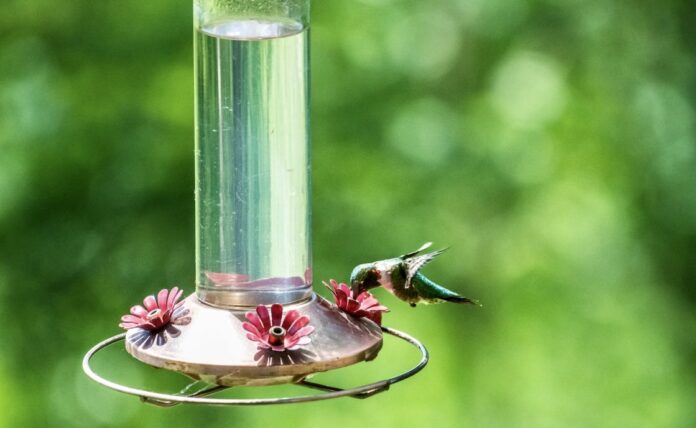Hummingbirds make a much-anticipated arrival in the spring, but keeping them around in the fall takes a little effort on the part of residents. By the time August rolls around, they’re ready for a sweet treat to help them power through the heat until fall migration leads them south. What attracts hummingbirds? How can you keep the wasps and bees from harassing them when they return? An Alabama Cooperative Extension System regional agent answers these questions and offers tips for proper hummingbird feeder etiquette.
Keep the bees at bay
Bethany O’Rear, an Alabama Extension home grounds, gardens and home pests regional agent, said there are several approaches to keeping bees and wasps out of hummingbird feeders.
“Denying the insects access to the syrup is the best defense,” O’Rear said. “Feeders come in two main designs: inverted bottle or basin. Basin feeders are usually better at keeping bees and wasps away since the syrup level is too low for insects to reach but is in range of hummingbird tongues.”
There are several companies that make basin feeders. To purchase one, check online retailers or visit a local store that sells bird supplies.
“When selecting a feeder, buy one that is easy on the upkeep,” O’Rear said. “One of the best styles of feeders for keeping uninvited critters–such as bees and wasps–away is a style that doesn’t have yellow plastic flowers around the openings, since bees and wasps are attracted to yellow.”
If a more ornate hummingbird feeder is a nonnegotiable, try moving it just a few feet. If that doesn’t keep the critters away, O’Rear suggests removing the feeder for a day or two. Hummingbirds may begin working the area for their treat station, but there is no need to worry. They will still be looking for it when wasps and bees have given up the chase.
Visual learners
O’Rear said hummingbirds learn to use feeders by watching other hummingbirds and through their own natural nosiness. Hummingbirds do learn to associate feeders with something sweet to eat and will often favor the style of feeder with which they are most familiar.
To attract hummingbirds, the color red works in flowers as well as feeders. However, avoid the use of red food coloring in the syrup mixture. It is unclear whether or not red food coloring has negative effects on hummingbirds, so it is best to avoid the dye altogether. The sweet spot for a mixture is four parts water to one part sugar.
“It is so important to avoid using honey in the feeder because it can develop a fungus that is fatal to the hummers,” O’Rear said.
More information
While hummingbirds aren’t a year-round garden guest, you can make their stay pleasant with a handful of intentional modifications. Learn more about hummingbirds and taking care of them in the Extension publication, Hummingbirds in Alabama available at www.aces.edu.




